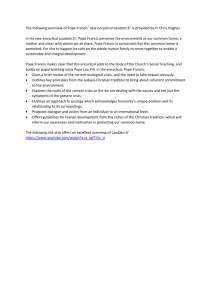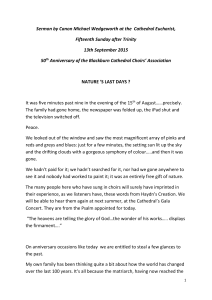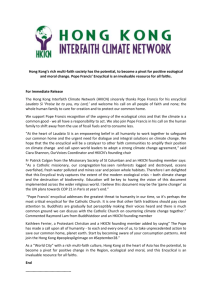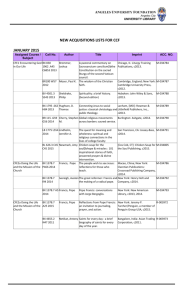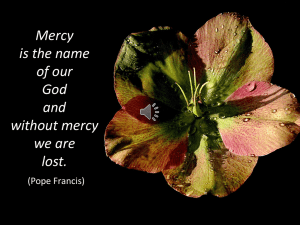GEM-6-12-AN INSPIRATION - St. Francis Xavier Church , Panvel
advertisement
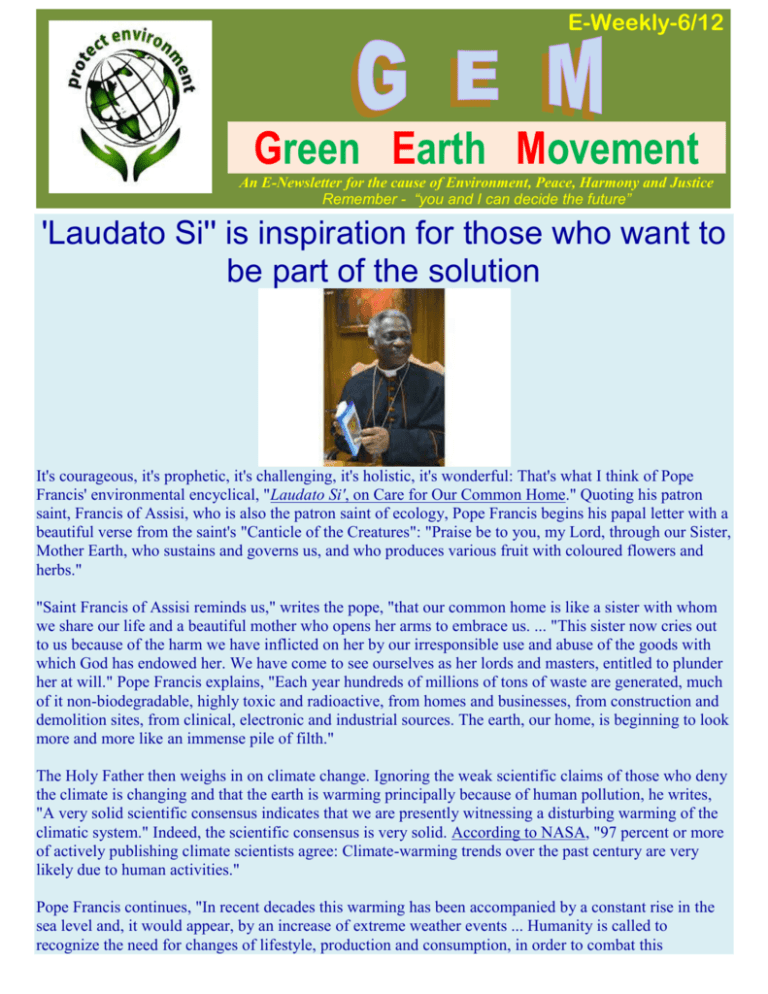
E-Weekly-6/12 Green Earth Movement An E-Newsletter for the cause of Environment, Peace, Harmony and Justice Remember - “you and I can decide the future” 'Laudato Si'' is inspiration for those who want to be part of the solution It's courageous, it's prophetic, it's challenging, it's holistic, it's wonderful: That's what I think of Pope Francis' environmental encyclical, "Laudato Si', on Care for Our Common Home." Quoting his patron saint, Francis of Assisi, who is also the patron saint of ecology, Pope Francis begins his papal letter with a beautiful verse from the saint's "Canticle of the Creatures": "Praise be to you, my Lord, through our Sister, Mother Earth, who sustains and governs us, and who produces various fruit with coloured flowers and herbs." "Saint Francis of Assisi reminds us," writes the pope, "that our common home is like a sister with whom we share our life and a beautiful mother who opens her arms to embrace us. ... "This sister now cries out to us because of the harm we have inflicted on her by our irresponsible use and abuse of the goods with which God has endowed her. We have come to see ourselves as her lords and masters, entitled to plunder her at will." Pope Francis explains, "Each year hundreds of millions of tons of waste are generated, much of it non-biodegradable, highly toxic and radioactive, from homes and businesses, from construction and demolition sites, from clinical, electronic and industrial sources. The earth, our home, is beginning to look more and more like an immense pile of filth." The Holy Father then weighs in on climate change. Ignoring the weak scientific claims of those who deny the climate is changing and that the earth is warming principally because of human pollution, he writes, "A very solid scientific consensus indicates that we are presently witnessing a disturbing warming of the climatic system." Indeed, the scientific consensus is very solid. According to NASA, "97 percent or more of actively publishing climate scientists agree: Climate-warming trends over the past century are very likely due to human activities." Pope Francis continues, "In recent decades this warming has been accompanied by a constant rise in the sea level and, it would appear, by an increase of extreme weather events ... Humanity is called to recognize the need for changes of lifestyle, production and consumption, in order to combat this warming." "The problem is aggravated by a model of development based on the intensive use of fossil fuels" -- that is, coal, oil and gas. The pope urgently calls for global conversion from the use of these fossil fuels to "clean and renewable energy" -- wind, solar and geothermal. "[Climate change] represents one of the principal challenges facing humanity in our day. Its worst impact will probably be felt by developing countries in coming decades." For example, "there has been a tragic rise in the number of migrants seeking to flee from the growing poverty caused by environmental degradation." "The warming caused by huge consumption on the part of some rich countries has repercussions on the poorest areas of the world, especially Africa, where a rise in temperature, together with drought, has proved devastating for farming," Francis writes. "Many of those who possess more resources and economic or political power seem mostly to be concerned with masking the problems or concealing their symptoms, simply making efforts to reduce some of the negative impacts of climate change." In a rebuke to some multinational corporations operating in economically underdeveloped countries, Francis writes, "Generally, after ceasing their activity and withdrawing, they leave behind great human and environmental liabilities such as unemployment, abandoned towns, the depletion of natural reserves, deforestation, the impoverishment of agriculture and local stock breeding, open pits, riven hills, polluted rivers and a handful of social works which are no longer sustainable." Francis then turns his attention to the growing scarcity of clean water, especially in Africa, and the reckless pollution of much of our existing water. And he writes about his concern regarding the privatization of water -- "turning it into a commodity subject to the laws of the market." "Our world has a grave social debt towards the poor who lack access to drinking water," Francis says. The pope expresses deep concern that the many injustices of market-based economies, together with environmental degradation, have their gravest effects on the poor and vulnerable. He writes, "The depletion of fishing reserves especially hurts small fishing communities without the means to replace those resources; water pollution particularly affects the poor who cannot buy bottled water; and rises in the sea level mainly affect impoverished coastal populations who have nowhere else to go." Francis tries to awaken the consciences of all, especially the economically and politically powerful, to the plight of the poor. He writes that in political and economic discussions, the poor seem to be brought up as an afterthought. "Indeed, when all is said and done, they frequently remain at the bottom of the pile." Francis astutely observes that living comfortable lifestyles far removed from the poor often leads to a "numbing of conscience" and to a cold, impersonal analysis. "At times this attitude exists side by side with a 'green' rhetoric. "Today, however, we have to realize that a true ecological approach always becomes a social approach; it must integrate questions of justice in debates on the environment, so as to hear both the cry of the earth and the cry of the poor." Observing the connection between the degradation of the environment and war, Francis writes, "It is foreseeable that, once certain resources have been depleted, the scene will be set for new wars." Pope Francis says in addition to highlighting the duty of each person to care for nature, the church "must above all protect mankind from self-destruction." The Holy Father sees the environmental problem as part of a much larger, more serious problem: Our failure to consistently recognize the truth that everyone and everything is interconnected. He explains, "When we fail to acknowledge as part of reality the worth of a poor person, a human embryo, a person with disabilities -- to offer just a few examples -- it becomes difficult to hear the cry of nature itself; everything is connected." "Since everything is interrelated, concern for the protection of nature is also incompatible with the justification of abortion," he writes. Pope Francis sees in St. Francis a perfect example of one who fully understood our interrelatedness. He writes that St. Francis "was a mystic and a pilgrim who lived in simplicity and in wonderful harmony with God, with others, with nature and with himself. He shows us just how inseparable the bond is between concern for nature, justice for the poor, commitment to society, and interior peace." Pope Francis has given the world a great gift. With wise insight, he has laid out for us the truth of our interconnectedness with all creation -- not only in the ecological web of life, but as people sharing one human nature and, spiritually, as brothers and sisters united to God, father of all. However, because we continue to ignore the vital necessity of nurturing this interconnectedness, the ecological, social and spiritual web is tearing. But if we care at all, we still have a little time to mend the tears. For anyone interested in being a part of the solution, "Laudato Si', on Care for Our Common Home" is a must-read! [Tony Magliano is an internationally syndicated social justice and peace columnist. He is available to speak at diocesan or parish gatherings about Catholic social teaching. His keynote address, "Advancing the Kingdom of God in the 21st Century," has been well received by diocesan gatherings from San Clemente, Calif., to Baltimore. His email address is tmag@zoominternet.net.] Editor's note: We can send you an email alert every time Tony Magliano's column, "Making a Difference," is posted. Go to this page and follow directions: Email alert sign-up. For the Power Point Presentation (PPT) of Pope Francis’ encyclical LAUDATO SI (PRAISED BE TO YOU) visit: www.stfrancisxavierpanvel.in Go to GEM section, PPT No. 32. You may download this PPT and use it for educational and awareness purpose for various groups. Waste not, want not Seema Redkar, National Award-winning officer from the Solid Waste Management Department of MCGM, explains why waste segregation is the way forward to minimise pressure on the city’s fast-filling dumping grounds Pooja Patel, DNA Waste segregation is one of the many answers to being part of a greener environment. Waste sorting needs to be a collective effort by citizens... this is in order to reduce the pressure on the city’s dumping ground. The four strata of society – the corporation, citizens, private corporate companies and the political clan – need to work together to make this step a reality. It is high time these four major stakeholders get together to benefit the environment. There are a number of people practising waste segregation in the city; currently, 617 ALMs (advanced locality managements) in the city are effectively sorting waste in their neighbourhood, and around 40 locations witness activities like composting. We need to scale this up by active participation. Mumbaikars need to understand segregation needs to be conducted from the source, i.e. from each household, hotels, commercial complexes among others. What is lacking, I feel, is awareness and publicity about the benefits as well as the necessity of this process. A lot of civic bodies (like the ones of Thane and Pune) allow rebate on property tax if the societies conduct waste segregation. I feel all corporations should adopt such pro-people and eco-friendly policies. I have been working with the slums for more than two decades now and it is surprising that the awareness level here is higher than the societies. On average, a person living in a society generates a kilo of waste per person per day, while a slumdweller would (probably) generate around 250gm. Also, slumdwellers recycle more than us (mostly due to their financial needs). They sell emptied milk sachets, metal scrap, newspapers (that are later recycled or reused) in exchange for other household items. We need to change how we store garbage in waste bins. Usually, most houses use plastic waste bin liners to stock garbage. It is important that we replace these plastic liners with bags that are compostable, which are corn or starch-based. Though these are not 100 per cent environment friendly, they do less harm than plastic bags. We need to understand that the environment is a chain, where production only ends with going back to nature. But this is not happening… now, we only add to the pollution. We need private industries that can create a market for recycled material, where products such as products are recycled. These private industries can also help in managing commercial waste like rexine from leather industries, cloth waste from textile industries and others. Along with this, we need public-private partnerships. I don’t see another way for managing waste. Finally, change yourself and society will change. —As told to Pooja Patel pooja.patel@dnaindia.net Available Educational PowerPoint Presentations (PPTs) on ZERO GARBAGE - PPT No. 6 AND WASTE TO COOKING GAS – PPT No. 18 Download these PPTs from our website: www.stfrancisxavierpanvel.in, GEM section Vanishing dumping grounds Ajit Ranade Mumbai, brimming as it is with garbage, needs to urgently pursue a strategy to convert waste to electricity Have you heard of the Smoke Affected Residents Forum? Mumbai must be the only city in the world to have such an association. The SARF is made up of people who are victims of toxic smoke from burning garbage. They live mostly in the vicinity of Deonar dumping ground. They probably have members from Mulund as well. Every now and then there is a fire in the dumping ground, caused either by miscreants or spontaneously due to inflammable material. That causes toxic fumes. Then they have to call the fire brigade. This year in February the fire, smoke and fumes were so bad that the entire Eastern suburbs were under smog, and visibility was very poor for a couple of days. Every now and then there is an informal advisory for residents to stay indoors, or at least to not let the kids out. The plight of asthma patients can only be imagined. This problem is not recent. In 2009, the Bombay High Court had to intervene because the SARF filed a contempt of court petition against the Brihanmumbai Municipal Corporation. The corporation had ignored orders of the court to do something about mounting garbage in the dumping ground back in 2003. The complaints actually had started much earlier, in 1996. The court asked that Deonar dumping ground be partially closed, as this was necessary to protect the fundamental “right to life“ of the people. If this were not done by BMC then it would amount to contempt of court. Matters didn't progress much till this year.It is not as if the BMC has been doing nothing. It has been looking for alternative sites for dumping grounds. Kanjurmarg may be opened soon despite earlier opposition and legal problems. Most dumping sites tend to be near residential areas, so they need safeguards and a buffer zone. In landscarce Mumbai this is a huge challenge. The BMC has also experimented with bio-mining, or composting as a solution to waste management. It has been asking for land from the state government. Some of the delay in complying with court orders is inherent in bureaucracies. Why does it take acourt to give an ultimatum to municipal authorities to do something about garbage? (In Delhi too they switched from toxic diesel to CNG for buses only after the Supreme Court ordered the local government). But for SARF and indeed all of Mumbai city, the garbage and the fumes have become a matter of life and death. (Swachch Bharat, anyone?) This year, matters came to a head as the court asked for immediate closure of both Deonar and Mulund. So BMC moved court to seek an extension. During this time it will explore opening Kanjur and new landfill is being explored near Taloja, about 70 km outside Mumbai. Kanjur will open in about two months. The November deadline looms large. Taloja is far and we will have to burn lots of diesel to get the garbage to that dumping ground, if and when the land is made available. This column has repeatedly made the plea that Mumbai is uniquely placed to convert its waste to electricity through a thermal power plant. We can aspire to zero-garbage status, like Sweden. The technology is proven and tested and more than a decade old. The sale of electricity at say Rs 8 or Rs 9 a unit will generate enough revenue to pay the rag pickers (who might lose their livelihood), and for the initial capital expenses of the power plant. It can be a zero-emission plant, eliminating not just toxic fumes, but all polluting emissions. For this project there is no serious need to separate wet and dry garbage, although it is a laudable goal (but needs change in our habits). Waste to watts, your time has come. Indian children spread pope’s message on climate change Kids want people to care and take steps to preserve the environment Ritu Sharma, New Delhi India July 14, 2015 Supporting Pope Francis’ global call for urgent action on climate change, children in New Delhi took to the streets to create awareness for the environment. “People tend to ignore the need to preserve the environment and carry on with their lives. I hope they will take into consideration what the pope has said on the issue,” Kalpana Singh told ucanews.com. Singh was among the 7-15 year-olds taking part in a dance event on New Delhi streets July 12 using colorful umbrellas, unicycles and holding banners, despite the heavy downpour. Deepak, who uses only one name, told ucanews.com, that he was concerned about the increasing number of natural calamities across the world. “We have caused this harm to our mother Earth and we will have to take steps to rectify it. The sooner we start, the better.” Pope Francis recently released the encyclical Laudato si' (Praise be to you — On Care For Our Common Home). Addressed to every person on the planet, the pope blamed human greed for the critical situation "Our Sister, mother Earth" now finds herself in. "This sister now cries out to us because of the harm we have inflicted on her by our irresponsible use and abuse of the goods with which God has endowed her," he wrote. The New Delhi event, a part of the Pope4Planet campaign, was organized by the Church-based social organizations Caritas India, Chetnalaya and Nine is Mine. More than 250 people signed petitions addressed to world leaders in the U.N. Climate Summit to be held in Paris in November, asking them to take responsibility for climate change and take steps to control it. “People are just waiting for an opportunity to do something for the environment,” Amrit Sangma, spokesman of Caritas India, told ucanews.com. Pope Francis’ letter expressing concern about climate change provides them this opportunity, he added. Sangma also pointed out that the “church's large network should be put to use to spread awareness about this increasing problem and ways to tackle it.” The campaign has the support of more than 200 partners in India working in solidarity with more than 164 international member organizations under the aegis of Caritas Internationalis. It prioritizes afforestation activities in India in order to limit global warming levels to a maximum of two degrees Celsius above preindustrial levels, as proposed by U.N. Framework Convention on Climate Change. Caritas India is also planning a number of “green activities” to encourage afforestation, renewable energy and sustainable agricultural practices, according to Fr. Frederick D'Souza, executive director of Caritas India. Report finds rumours, fear-mongering in Western Ghats eco-sensitive area Ananya Dutta,TNN | Jul 17, 2015 PUNE: "If your village is declared as part of the eco-sensitive area (ESA) then no one will want to marry your daughters" — This is just one of the reasons being bandied about in villages to drum up opposition to the notification declaring 37% of the area in the Western Ghats as an ESA. While the above example may be extreme, the fear-mongering in the villages that fall in this region include claims that the ESA would cause disruptions in agricultural practices or even relocation of villages. After the K Kasturirangan committee recommended the declaration of the ESA based on satellite data, the Union government had told the states concerned to carry out a 'ground-truthing' exercise. The impact of the campaign of misinformation by vested interests during this period has been documented in a recent report called 'Citizens' fact-finding report on the public consultation process as part of ground-truthing in the Western Ghats'. The report has made a comparative analysis of the public consultation process in four of the six states in the Western Ghats region — Maharashtra, Karnataka, Goa and Kerala. The document was prepared by Jhatkaa, a Bangalore-based citizens' campaigning group, with the help of activists working in each state. "The individual experience in each state will perhaps be different, but we certainly found efforts to spread misinformation about the ESA across the region. In some places, the lack of transparency in the process was striking; we couldn't even find any information on Gujarat or Tamil Nadu," said Tania Devaiah, a campaigner at Jhatkaa. City-based environmentalist Saili Palande-Datar, who has contributed to the report, cited an example of the confusion regarding the notification. She received questions from residents of Koyna village, who were being told that they would be relocated once their village was declared as part of the eco-sensitive area. "They have already been displaced twice — first because of the dam and later when the wildlife sanctuary was notified. They are apprehensive that this notification will make them move a third time, which is far from the truth," she said. The report says that local political interests and pro-mining lobbies are fanning the flames. "There has been a concerted effort to derail the ESA process — Billboards belittling Professor Madhav Gadgil (the head of the Western Ghats Ecological Experts Panel that preceded the Kasturirangan Committee) have been put up, and rumours are being spread about how harmful the ESAs would be," the report notes. Mahadev Bhise, a resident of Amboli village who attended a public consultation meeting, said that many rumours are being spread in the area near his village. "Some people were told that they will not even be able to hammer a single nail in their houses," he said. Other misinformation being circulated includes claims that farmers will not be able to use chemical fertilisers in their fields and that no one will be able to carry out any repairs in their houses, he added. Vilas Bardekar, chairman of the Maharashtra State Biodiversity Board (MSBB), is overseeing the ground-truthing exercise in the state. Bardekar said that the committee had not received any formal complaints on the matter. "There are some places where such rumours have been circulated, but we are addressing them through the public consultation process. Overall, I think public opinion is in favour of the ESA," said Dilip Singh, member secretary of the MSBB. Sources in the board said that although they encountered these rumours during the process of these consultations, there was little clarity on who was spreading the misinformation. Most of the queries were regarding the future of agricultural land, because people were being told that this was an attempt at a land grab by the government, they said. Available Educational PowerPoint Presentations (PPT) on FORESTS ARE GREEN LUNGS– PPT No. 23 Download this PPT from our website: www.stfrancisxavierpanvel.in, GEM section Tax sugary drinks by 20%, say doctors www.bbc.com/news/health It estimates poor diets are causing around 70,000 premature deaths each year. In a major report on unhealthy diets, the body called for the extra money raised to be used to subsidise fresh fruit and vegetables. The Food and Drink Federation said the measure would not change diets. There has been growing concern about the damaging impact of sugar on health - from the state of people's teeth to type 2 diabetes and obesity. In its Food for Thought report, the BMA warns that a 330ml can of pop is likely to contain up to nine teaspoons of sugar that are simply "empty calories". The report said taxing specific food groups - such as the sugar drinks tax introduced in Mexico - were shown to cut consumption. Doctors said a tax of at least 20% would be needed to deter customers. It would mean a 65p can of fizzy drink would cost at least 78p and a two-litre bottle would shoot up from £1.85 to £2.22. The report says the extra revenue should be used to make fruit and vegetables cheaper so that we "create an environment where dietary choices default to healthy options". 'Massive problem' Dr Shree Datta, from the British Medical Association, told the BBC: "I think it is a massive problem illustrated by the fact obesity is creeping up. "We're looking at 30% of the UK population being obese by the year 2030, a large extent of that is due to the amount of sugar we're actually consuming without realising. "The biggest problem is a lot of us are unaware of the amount of sugar we are consuming on a day-to-day basis." The government's main approach to obesity has to been to work with the food industry to get it to voluntarily reduce calorie content. A spokeswoman said obesity was of "great concern to this government". She added: "There is no silver bullet but we do want to see industry go further to cut the amount of sugar in food and drinks so that people can make healthier choices." The BMA's report is timely. Later this week, the UK's official Scientific Advisory Committee on Nutrition will publish its final advice on the amount of sugar we should be eating. Its draft report said sugar added to food or naturally present in fruit juice and honey should account for 5% of energy intake. The current recommended level is 10% and many people fail to meet that. Ian Wright, director-general of the Food and Drink Federation, said: "We share the BMA's concerns about the health of young people in the UK." However, it said many foods were already taxed at 20% through VAT such as soft drinks and confectionery. He added: "Where additional taxes have been introduced they've not proven effective at driving long-term, lasting change to diets. "In recent years, calories in household foods and drinks have been gradually lowered through recipe reformulations, including sugar reductions, and changes to portion sizes." Available Educational PowerPoint Presentations (PPT) on SOFT DRINKS – AN HEALTH HAZARD– PPT No. 7 Download this PPT from our website: www.stfrancisxavierpanvel.in, GEM section ASIA : “Bring Laudato si’ to the edges of society” Card. Luis Antonio Tagle Manila (AsiaNews) “The many quotations of bishops’ conferences from all over the world in the encyclical show that the local Churches have been addressing the ecological issue for a number of years now,” said Card Luis Antonio Tagle, Archbishop of Manila, in his message as new president of Caritas Internationalis. Below, please find the full text of Cardinal Tagle’s message. Dear Caritas friends, In some parts of the world babies are born, children grow up and adults face the end of their lives living and working in the poisonous waste created and discarded by others. In other parts, people live on a tightrope between floods and droughts and grave injustices. In these places, life is slowly strangled from the very beginning. This is not God’s design for humanity and the Earth. Life is moving so fast that many people are disorientated. The faster life goes, the more we consume, the more we waste and the further away from God and the poor we move. With this over-consumption comes a heaviness – not just physical but also spiritual. We gather so many things into our heads and lives that one more thought or fact or responsibility overwhelms us into lethargy. In June, Pope Francis called each of us to undertake a mission to save the planet, our relationship with God and our human family. He gave us a reminder to “take the trash out of our lives” and clean it up out of everyone else’s so we can live as one human family in dignity and in unity. In the encyclical Laudato Si’ the Holy Father lays the path for a global “ecological conversion”. I would like to echo this call to the whole of the Caritas family and invite you to welcome into your hearts Caritas’ strategic vision “One Human Family, Caring for Creation”. In Laudato Si’ Pope Francis reminds us to replace consumption with a sense of sacrifice, greed with generosity and wastefulness with a spirit of sharing. We must “give, and not simply give up”. We are called to free ourselves from all that is heavy and negative and wasteful and to enter into dialogue with our global family. This requires a process of universal communication and listening in truth, a global examination of conscience, a global recognition of failures and guilt and a global resolve to right the harm already done. We need to recover the horizon of gift and grace within which every creature finds its place. We need to see our human vocation to live with the family of creation as stewards and not owners. This requires us to be energetic, driven and creative but never domineering and abusive. In Caritas, I have witnessed the power of active love at work in the midst of this global ecological crisis. Caritas workers build bonds of solidarity with people living on trash heaps. They reinforce the dignity of the poorest who are battered by climate change. Caritas volunteers accompany people across the world in their efforts to build up their lives and homes and send their children to school. Caritas is the living Word of God in the poor communities of the world. It is a free-flowing river of love and hope, which nourishes and has an enormous natural power to bring about change. As Caritas and as members of the human family, we all have a role to play in this ecological revolution to which Pope Francis has invited us. We must strengthen the ties among our organisations so we work better together. By pooling our resources, sharing information and supporting one another we can show that it is possible for people of good will to restore hope together. We must use all of our knowledge and experience to come up with “bite-size” initiatives which will enable ourselves and any member of society to embark on the lifestyle changes necessary for personal conversion. We must think long and hard about how to make sure that the message of the encyclical reaches the extremes of society: the poorest who suffer unjustly because of other people’s choices, and the elites who have an enormous power to bring about global change and yet shy away from this responsibility. The many quotations of bishops’ conferences from all over the world in the encyclical show that the local Churches have been addressing the ecological issue for a number of years now. We thank Pope Francis for bringing these voices together into a “chorus” of praise, lament and call. I believe that Church leaders, especially Caritas bishops have a major role to play making sure people take to their hearts the message of Pope Francis’ encyclical by pushing for a Christian spirituality of ecological integrity. Such a spirituality includes a recovery of a contemplative stance that sees and appreciates the beauty of creation. We need to shape a spirituality that invites politicians, business people, artists, educators, scientists and builders to work for the common good, respecting the dignity of each person, especially of the poor and most vulnerable. God’s love is the fundamental moving force in all created things. Caritas is a manifestation of that love which translates “global warming” into a worldwide warming of our hearts to the poor. Yours in Christ, + Luis Antonio Tagle, Archbishop of Manila, Philippines China struggles to contain the environmental damage of its rapid growth Courtesy: BBC news At a conference in Ethiopia this week, the world is discussing the funding for a new set of international goals on sustainable development. Any global attempt to push for sustainability will need the world's biggest country on board. China represents a fifth of the world's population, and after more than three decades of high speed growth it is grappling with the challenge of cleaning up environmental damage and creating a more sustainable future. China Editor Carrie Gracie visited Hunan Province in central China to assess the progress of the cleanup there. Water should be a life giver. But in the fields of Zhubugang it is a silent killer. Yang Juqing, 68, is irrigating her fields of green pepper and aubergine. But her water is polluted with industrial waste. She leads me along a fetid ditch which is full of black bubbling water leading back to a high brick factory wall with smokestack chimneys behind. This land was once known as China's basket of rice and fish. But Zhubugang is also rich in minerals. So as China became the factory to the world, this area became a centre for the chemical industry. The crops began to suffer: untreated effluent in the water, heavy metals in the soil, sulphur dioxide in the air. Tendrils of vine wind up a bamboo frame and Mrs Yang reaches across to pluck a winter melon, cracking it open and showing me the rotten inside. She's been farming here all her adult life but she says that in recent years, the crops have been useless. "Here in this village, many people have cancer. Three people died in the space of as many months. They were all so young. It's so toxic here," Mrs Yang says. China is often congratulated for pulling hundreds of millions of people from poverty. But wealth has come at a terrible price. Unregulated smokestack industries have ravaged the environment and damaged the health of generations. Next door to Mrs Yang, the neighbours are sliding the lid off the well in their courtyard to pump water from twenty metres underground. They tell me they buy bottled water for the baby, but they can't afford it for the rest of the family. The wife holds the end of the rope as the husband tentatively lowers the pump down the well shaft. She jerks her chin in the direction of the forest of chimneys on the other side of the fish pond. "If it wasn't for the factories that would be clean water down there but because of them it's heavily polluted." It's not just Zhubugang. A fifth of China's arable land is poisoned with heavy metals, most of its groundwater is polluted and some experts say air quality is now a bigger killer than smoking. Numbers like this are forcing Beijing's hand. Across the country, some of the largest antigovernment protests now focus on pollution problems. And the wealthy middle classes in the big cities are increasingly impatient for action to guarantee clean air, water and food. In March this year Premier Li Keqiang told the annual session of China's parliament, the National People's Congress: "Environmental pollution is a blight on people's quality of life and a trouble that weighs on their hearts…We must fight it with all our might." From province to city to township level, the message has made its way down to Zhubugang that creating jobs and turning a profit can no longer come at the expense of public health. All the chemical complexes which have sprung up haphazardly and without regulation have now been ordered to move. Local environmentalist Song Wei says she is encouraged: "No more economic growth stained by blood. Under the new environment law, every factory has to be approved before it's built. We're putting an end to unregulated chaos." We visit one of the factories forced to move to a dedicated industrial zone, a supplier of enamel paints and glazes for cookware. Company boss Liang Menlin tells me that in the Zhubugang days, the minerals were mixed by hand, no one bothered with masks and there was toxic dust everywhere. Now the minerals are machine ground in sealed chambers and dust is extracted by vacuum pumps. "Internationally, standards are rising and technology is more advanced. What's more, environmental inspections are much more frequent than in the old days. Traditional methods of manufacturing have to give way to the big trend for environmental protection. No company can afford to fall behind." As for the basket of fish and rice that all these people remember from the Zhubugang of their childhood, there is no going back. The soil is too contaminated to be farmed again. Instead factory sites will be reassigned as urban real estate and the remaining farmers will be moved out to apartment blocks. Right incentives Pan Jiahua of the Research Centre for Sustainable Development at China's Academy of Social Sciences reminds me of the enormous pressure that urbanisation itself places on China's resources and ecology. "The real concern is consumer behaviour. People want a modern, comfortable way of life…a big car, a large apartment, air-conditioning in the summer, heating in the winter. All of this is new in China. It's not wrong but it's so vast and so sudden. We are just not prepared for the consumption of energy and natural resources," Prof Pan says. But Prof Pan is confident that with the right incentives for government officials and a determination to enforce regulations, China will move from its headlong rush for growth to a future of sustainable development. "Now we have the investment, the demand, the technologies, the determination. If we decide to get things done I don't think that will be a huge challenge." Everyone has a stake in Prof Pan being right, and for some its urgent. The Zhubugang sprawl is being demolished, but close by lies another maze of crumbling factories and according to the families who live among them, they show no sign of leaving. Next door to a foundry, we visit three-year-old Yangyang who has three times the safe level of lead in his blood. The air smells foul and stings our eyes. As Yangyang spins round the yard on his scooter, his grandmother tells me she's never had a lungful of clean air in her life. His father says they are all the voiceless victims of the country's rush for wealth."The central government has good intentions. It does want to clean up the pollution. But we don't know where the money goes on the way down the chain. By the time it gets down here there isn't any money left." Yangyang's father washes an apple in a tin basin, pointing out that he has no idea how safe either the water or the apple is to Yangyang's health. So how confident is he that the air will improve in his son's lifetime? "Things should get a bit better …maybe in ten years or twenty years, things should improve somewhat." China has a long, long way to go to make good on its promise to children like Yangyang: a sustainable future in which every life counts. She Begged On Streets So She Could Feed Every Orphan She Saw! www.thebetterinida.com Born on 14 November at Pimpri Meghe village in Wardha district of Maharashtra, Sindhutai Sapkal was keen on completing her education and used Bharadi tree leaves to write as the family could not afford a slate. But, she could not continue her studies after fourth grade due to family responsibilities and she got married at a tender age of 10 to a 30-year old man. Her abusive husband beat her up and threw her out of the house when she was 20 and nine-months pregnant. She gave birth to a baby girl in a cow shelter outside their house the same day and walked a few kilometres in that condition to her mother’s place, who refused to give shelter to her. “I cut the umbilical cord with a sharp-edged stone lying nearby,” she recalls. The incident deeply affected her and she thought of committing suicide, but gave up that thought and started begging at railway platforms for food to look after her daughter. As she spent more time begging, she realized that there are many orphans and children abandoned by their parents. Having faced the difficulties herself, she decided to adopt them. She started begging more earnestly in order to feed the many children that she had adopted. Gradually she decided to adopt every child who was as an orphan and, over a period of time, she emerged as the “mother of orphans”. Till date, she has adopted and nurtured over 1,400 orphans, made them lawyers, doctors and engineers, and got them married and helped them settle down. She is fondly referred to as “mai” (mother). To eliminate the feeling of partiality among children she gave away her biological daughter to Shrimant Dagdu Sheth Halwai. Her daughter herself runs an orphanage today. Many years later, her husband came back to her and apologized for his harsh deeds. Having devoted all her life to the orphans, she forgave him and accepted him as her child, as she could only harbour motherly love for all. She affectionately introduces her 80-year old husband as the eldest child. For her immense courage and compassion she has received over 500 awards. Whatever amount she received as awards, she used it to construct homes for her children. She has six organizations operating under her name which work for various needs of orphans. Her life’s story inspired many and a Marathi film called “Mee Sindhutai Sapkal” was made on her which won a national award. The unusual life of Sindhutai is an inspiration for all of us. We salute this brave lady and hope that the country gives birth to many such strong daughters and mothers. Read more on http://goo.gl/sdOihY Delhi government to launch 'aam aadmi' canteens in Delhi, provide meal for Rs 5 Jul 16, 2015, IBNLive New Delhi: Cheap meal for the common people of Delhi is soon going to be a reality with the Arvind Kejriwal government deciding to start 'aam aadmi' canteens in the national capital which will provide meals for Rs 5 to 10. The canteens will first be started in industrial areas, hospitals and commercial institutes which will be run by the Food and Civil Supplies department. A Delhi Dialogue Commission (DDC) proposal in this regard was approved by Chief Minister Arvind Kejriwal on Thursday, setting the ball rolling for its implementation. There was no official word on the amount of subsidy required for the scheme though. "Today the choice is limited for the poor when it comes to having nutritious food. They have to depend on food that is often unhygienic yet pricey," DDC Vice-Chairman Ashish Khetan told reporters. Breakfast, lunch and dinner would be available in the canteens which would mainly cater to construction labourers, slum dwellers, students and office-going population alike. When asked about the possible expenditure, Khetan referred to the Tamil Nadu model which, he said, needs around Rs 65 crore annually to run 225 canteens. "The detailed work map is being worked out," he added. The Aam Aadmi Party government is closely following 'Amma Canteen' model started by Tamil Nadu government while implementing this scheme. The Amma Canteen scheme is a hugely popular one. At these canteens, good quality food is sold at very cheap rates three times a day morning, afternoon and night. The Amma Canteen concept involves selling food items such as sambar rice, curd rice, lemon rice, idly and chapatis at very low rates and is aimed at benefiting the working class population, including daily wage labourers. Each Day is a New Gift, Priyanka Reena Quadros, courtesy: daijiworld. com Every day, once we wake up in the morning, we receive a new gift wrapped with a lot of new surprises awaiting us, new challenges, new duties, new responsibilities and so on. The way we open the gift wrapper decides how well the gift remains, whether it remains intact or get damaged. Each day is indeed a wonderful gift from God, provided, we accept it wholeheartedly and make the best possible use of it. No human being is perfect on this universe but we do have some inbuilt talents which we need to identify and recognize. Each one of us is unique and special. All we need to do is to believe in ourselves and at the same time rely on God’s unique plans for us. Jennifer Lopez has very beautifully quoted, “There are all ideals about what is perfect and what is beautiful and what is smart, but the most appealing thing is, that which is me is nobody else.” We may sometimes fail to recognize what we are capable of. But, we must never lose hope, pray to God and wait for the right moment. A word of appreciation and encouragement from others may also help us to identify our unique talents. We may not receive everything on the same day. Therefore, we must learn to be content with whatever we have and treasure every new day that we come across just like we preserve the gifts given by our loved ones. An American author Augustine “Og” Mandino II has beautifully explained the importance of each day saying, “Each day is a special gift from God, and while life may not always be fair, you must never allow the pains, hurdles and handicaps of the moment to poison your attitude and plans for yourself and your future. You can never win when you wear the ugly cloak of self-pity, and the sour sound of whining will certainly frighten away any opportunity for success.” We must never consider a new day as a burden but thank God for having given us this day. The baseball player Eric Davis says, “Blessings can come in a number of ways. The Lord doesn’t give you what you want, the Lord gives you what you need.” We must thereby never be discouraged, trust in God’s plans and try to identify the blessings that God has given us. Fear must never become a hurdle in our path. We, as human beings tend to make mistakes unknowingly. We must not worry about it as every mistake teaches us a new lesson. Even the previous day’s mistakes must not dishearten us and prevent us from enjoying God’s precious gift to the fullest as Coulton E. Knox has told us, “Let not the mistake of yesterday nor the fear of tomorrow spoil the day.” Sometimes, we might come across people who try to discourage us and create barriers in our path. But, we must not step backwards. Bono has very clearly quoted, “Whenever you see darkness, there is extraordinary opportunity for the light to burn brighter.” Hence, we need to be very quick in grabbing all the opportunities that knock the door since we never know if we would get a second chance. An unknown author has beautifully quoted, “Always believe something beautiful is going to happen. Even with all the ups and downs, never take a day for granted. Smile, cherish the little things and remember to hug the ones you really love.” Therefore, we must never forget to consider each day a new gift, be thankful to God, remember that the best is yet come and keep in mind that all of us can make a difference. WANTED HELPING HANDS- Courtesy: Daijiworld.com For more appeals visit – www.daijiworld.com - charity Savitha(37),Kuchila Bail,Near Manor Temple,Neermarga Village,Mangaluru575029 Monday, June 29, 2015 Savitha(37), W/o Vasanth, 2-118, presented with complaint of sudden onset of headache, alteration of sensorium with right sided limb weakness. Diagnosed left MCA aneurysm. She underwent left pterional craniotomy, clipping of multilobulated MCA aneurysm under GA on February 13, 2015. Post op uneventful. On discharge she was conscious,had improvement in her limb weakness to extent of walking with support and feeding herself. Speech was however aphasic. She is under treatment at A J Institute of Medical Sciences. She is very poor and unable to pay for the medical treatment. She has requested kind hearted donors to help her financially so that she can get herself treated. Your kind remittances may please be sent to her following bank account: Bank Account No.: 181400101003122 Name of the Account Holder: Savitha Bank: Corporation Bank, Door No. 3-113,Crystal Center, Crasta Compound, Neermarga Main Road, Mangalore 575029 IFSC Code: CORP0001814 Telephone No: 91 97310 13757 Prajoth D'Souza (23), Prashanth Nilaya, Anjare, Manjeshwar, Kerala state,671323 Wednesday, June 24, 2015 Prajoth D'Souza (23), son of Felix D'Souza, resident of Prashanth Nilaya, Anjare, Manjeshwar, Kerala state, has been suffering from Acute Lymphoblastic Leukemia (blood cancer). Prajoth had recently completed a course in interior designing, and started supporting the family, when he was diagnosed with the above ailment. He has been undergoing chemotherapy at KMC Hospital Mangalore at the advice of the hospital doctors. KMC Hospital has estimated cost of Prajoth's treatment at about five lac rupees. Prajoth lives with his parents and brother. The family, which does not have any substantial means, is finding it a formidable task to continue with the said treatment because of high cost involved. Having been hard-pressed for money to treat Prajoth, the family has requested willing donors to extend possible help. Bank account details: SB account number: 012900101024586 Prajoth D'Souza Corporation Bank, Poonja Arcade, K S Rao Road, Hampankatta, Mangalore. IFSC: CORP0000129 Phone: 91 04998-279277/ 91 97430 81997 Published by Fr Felix Rebello c/o Infant Jesus Church, Jogeshwari Mob. 9819688630, Email:frfelixrebello@gmail.com, gemenewsletter@gmail.com website: www.stfrancisxavierpanvel.in GEM E-Newsletter Facebook Link http://www.facebook.com/gemenewsletter
